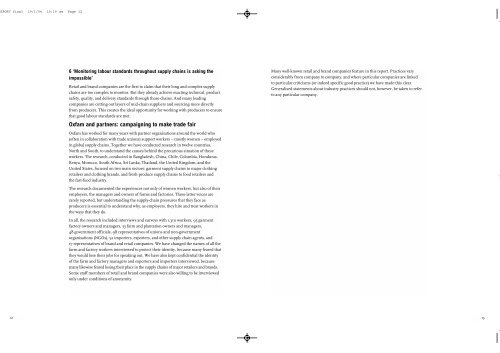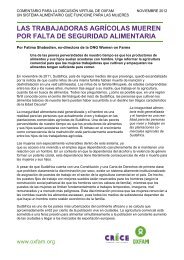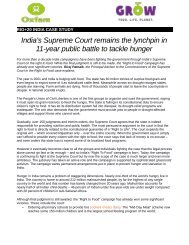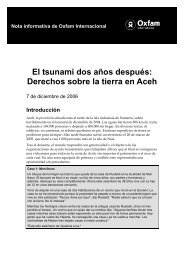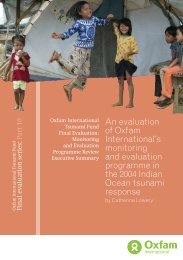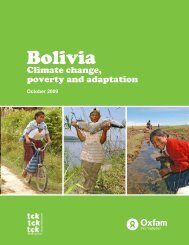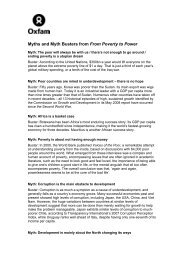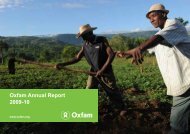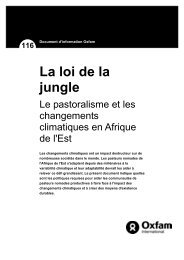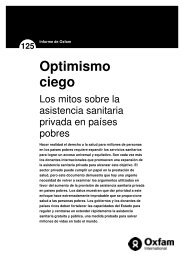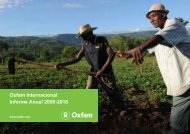EPORT final 19/1/04 10:19 am Page 10Ways ahead, and false debates to leave behindThis report argues that companies need to change their sourcing and purchasing practices,if their commitments to be socially responsible are to be more than empty words.Better sourcing and purchasing practices alone would not lead to decent employmentand working conditions, but they are an essential part of the solution, and a part that hasso far been largely missing from the debate. This report likewise calls on governmentsto ensure that poor people benefit from trade by ratifying and implementinginternational labour standards, extending employment protections to all workers and,especially, creating the space for workers to join unions and bargain collectivelywithout fearing for their jobs.Some commentators will reject this strategy. In particular, enthusiasts for the currentpattern of globalisation will argue that more of the same is needed to generate highergrowth, increased employment, rising living standards, and ultimately improved labourstandards. The arguments that they put forward are well known.1 ‘Trade and growth first, labour standards will follow’Trade creates jobs – so the reasoning goes – and as the excess supply of labour falls,wages and working conditions rise. But the link between trade and economic growthis far from automatic, or that between job creation and better labour conditions.Markets may play a critical role in defining the efficiency of resource allocation andgenerating growth, but market realism has to be tempered with considerations of socialjustice. Labour rights are not a distant reward of development: they are an essential toolfor alleviating poverty through trade today.2 ‘Jobs in trade are better than the alternatives’Many economists point out that export-sector workers already tend to earn higher wagesthan other workers, let alone the unemployed. A woman in Bangladesh sewing clothesfor Wal-Mart, so the argument runs, is surely better off than her sister working on alocal construction site. In the words of the economist Paul Krugman, ‘In praise ofcheap labour: bad jobs at bad wages are better than no jobs at all.’ 4 True: and that is whymillions of women take these jobs. But if the best deal that trade can offer to poor peopleis a marginal improvement over a life of desperate poverty, it is falling far short of itspotential. The relevant question is not whether the Bangladeshi woman is marginallybetter off but whether she, her family, and her country are getting a fair share of thegains that she helps to generate through trade.3 ‘Improving labour standards is hidden protectionism’Some claim that improving employment security and benefits for workers in poorcountries will take away their trade advantage and price them out of the market.From this perspective, calling for respect for workers’ rights is just another variety ofNorthern protectionism. This is a weak argument. The cost of providing basic benefitssuch as maternity and sick leave differs hugely across rich and poor countries. If allcountries provided these benefits, relative costs of labour would still be far lower inpoor countries. And workers’ organisations in many poor countries are driving thedemands for these rights at work to be respected – not to protect Northern jobs butrather to protect their own well-being, health, and dignity. Universal respect for basicrights at work need not adversely affect the competitive position of low-incomecountries.4 ‘Strengthening rights will cut jobs’Some fear that better wages and benefits will mean fewer jobs, leaving communitiesworse off. Not necessarily so: governments hoping to win investment on the basisof low wages have an out-of-date strategy. ‘Forget about cheap labour,’ advisesDavid Birnbaum, an expert on global garment-sourcing trends. ‘Poverty is no longeran asset. There is always some new garment-exporting country where workers earn lessthan yours.’ 5 Low wages and insecure jobs perpetuate poverty in poor communities.When women are better paid and protected in their jobs, they can invest in theirfamilies, sending their children to school rather than into the factory or fields to work.It helps to build a more productive and skilled workforce – and that does attractinvestors. All this could help to stimulate domestic and regional sources of consumerdemand. In other words, shared prosperity is good for investment – poverty is not.5 ‘More secure jobs undermine flexibility’Proponents of flexible labour laws (encouraging short-term contracts and easy hiringand firing) argue that they are essential to allow firms to respond to fluctuations indemand. True: seasonal fluctuations mean that labour requirements vary through theyear, and employers need to be able to adjust. But ‘flexibility’ is hugely abused in orderto secure the long-term effort of workers at short-term costs. Employers in the Northand South misuse short-term contracts to avoid paying employment benefits and toundermine workers’ bargaining power in organising. Retail and brand buyersexacerbate the problem by changing orders at short notice and pushing for prices thatcannot cover the full costs of stable employees. Flexibility matters – but social justiceconsiderations should set limits to the level of flexibility demanded, especially inunequal economic relationships.1011
EPORT final 19/1/04 10:19 am Page 126 ‘Monitoring labour standards throughout supply chains is asking theimpossible’Retail and brand companies are the first to claim that their long and complex supplychains are too complex to monitor. But they already achieve exacting technical, productsafety, quality, and delivery standards through those chains. And many leadingcompanies are cutting out layers of mid-chain suppliers and sourcing more directlyfrom producers. This creates the ideal opportunity for working with producers to ensurethat good labour standards are met.<strong>Oxfam</strong> and partners: campaigning to make trade fair<strong>Oxfam</strong> has worked for many years with partner organisations around the world who(often in collaboration with trade unions) support workers – mostly women – employedin global supply chains. Together we have conducted research in twelve countries,North and South, to understand the causes behind the precarious situation of theseworkers. The research, conducted in Bangladesh, China, Chile, Colombia, Honduras,Kenya, Morocco, South Africa, Sri Lanka, Thailand, the United Kingdom, and theUnited States, focused on two main sectors: garment supply chains to major clothingretailers and clothing brands, and fresh-produce supply chains to food retailers andthe fast-food industry.Many well-known retail and brand companies feature in this report. Practices varyconsiderably from company to company, and where particular companies are linkedto particular criticisms (or indeed specific good practice) we have made this clear.Generalised statements about industry practices should not, however, be taken to referto any particular company.The research documented the experiences not only of women workers, but also of theiremployers, the managers and owners of farms and factories. These latter voices arerarely reported, but understanding the supply-chain pressures that they face asproducers is essential to understand why, as employers, they hire and treat workers inthe ways that they do.In all, the research included interviews and surveys with 1,310 workers, 95 garmentfactory owners and managers, 33 farm and plantation owners and managers,48 government officials, 98 representatives of unions and non-governmentorganisations (NGOs), 52 importers, exporters, and other supply chain agents, and17 representatives of brand and retail companies. We have changed the names of all thefarm and factory workers interviewed to protect their identity, because many feared thatthey would lose their jobs for speaking out. We have also kept confidential the identityof the farm and factory managers and exporters and importers interviewed, becausemany likewise feared losing their place in the supply chains of major retailers and brands.Some staff members of retail and brand companies were also willing to be interviewedonly under conditions of anonymity.1213


